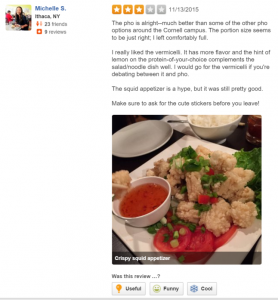Information Cascade through Yelp
With the increasing number of internet users, the social media is becoming more and more of a significant influence on our lives. Businesses especially take advantage of the social media so that they can increase profits through advertising or promoting their customer service and good reputation. With this purpose in mind, review sites, such as Yelp.com, was created so that the public can access another user’s reviews and ratings of the business. Specifically, we will focus on Yelp.com and how these reviews construct an information cascade.
Yelp.com is a popular review site that receives approximately half a million different users a month so that users can either read reviews or critique restaurants. This website is convenient, because it is free, organized and user reviews are easily accessible. The website conveniently displays the location of the restaurant, pictures of the food, average price range, hours of operation, and most importantly the reviews of Yelpers.
In order to appeal to the customers, restaurants desire good reviews and a good reputation. A good reputation or bad reputation can be affected by an information cascade, which is inevitably created by Yelpers, because future customers are more likely going to make choices that are most similar to the past reviews. These reviews can ultimately change you initial thought on the restaurant. For example, a user heard from a professional restaurant critique that Restaurant A had the best Indian cuisine. After a search on Yelp.com, you discover that Restaurant B had better reviews than Restaurant A. Reviews on Restaurant B stated that it had better food and better customer service. Based off of this information, an information cascade occurs if you decide to eat at Restaurant B instead of your initial Restaurant A. Likewise, the opposite can happen where the reviews on Yelp.com uphold the restaurant critic review.
Users have no idea to verify whether the reviews on Yelp.com are reliable sources or not. However, users still decide to fuel the information cascade and select the most popular choice. Because information cascade exists within Yelp.com, many businesses look to leverage the website by creating fake reviews in support of their business. Businesses that have poor reviews are more likely to create fraudulent reviews, because these businesses have nothing to lose as they naturally have more 1-star reviews.
Works Cited:
http://snap.stanford.edu/class/cs224w-2011/proj/emmao_Finalwriteup_v1.pdf

